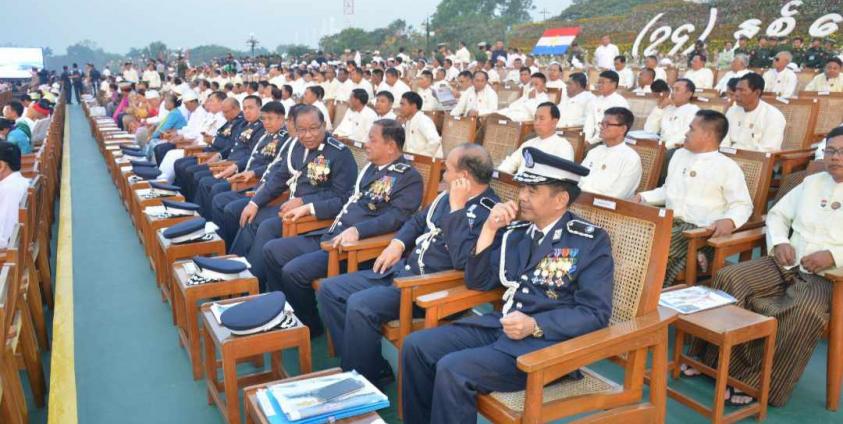In the two and a half years since the military coup, more and more previously civilian roles in the Junta’s administrative apparatus, are being filled by military officers, according to political analysts and sources of the military community.
The Myanmar Gazette in late September reported that the military has transferred ten officers with the rank of captain to assume roles as chief officers and assistant managers across three civil ministries.
As part of these transfers, two officers have taken up roles as chief officers within the Road Transport Administration Department under the Ministry of Transport and Communications. Additionally, one officer has been appointed as an assistant manager in Myanmar Posts and Telecommunications, and the five have assumed positions in the Department of Trade and Department of Consumer Affairs under the Ministry of Commerce.
During the coup, military officials, often referred to as "Moe Kya Shwe Ko" by civilian employees, were increasingly deployed to civilian departments. "Moe Kya Shwe Ko" represents retired military officers who transitioned to civilian roles and gained significant influence and privileges.
In August two executive assistants, who are retired military officers, were appointed as chief officers in the Department of Social Welfare under the Ministry of Social Welfare Relief and Resettlement.
Air Force Sergeant Zeya, who joined the Civil Disobedience Movement (CDM), shared with Than Lwin Times that the Military Council's strategy of placing military officers in civilian departments seems to be a deliberate move aimed at creating a fully militarized administrative regime.
Zeya explained, "Following the military coup, the primary rationale behind positioning "Moe Kya Shwe Ko" in senior roles within civilian departments, rather than lower-level positions, is a deliberate move to enforce a system they have designed. They believe it is more efficient for military personnel to collaborate with each other. Their aim appears to be the creation of a system where the military holds sway throughout the entire nation. Additionally, they have reshaped the education system to instill the ideology of military dominance in education."
As part of the Military Council's transition to civilian departments, the rank of colonel has been designated for the director's position, the rank of lieutenant colonel for deputy director roles, the rank of major for deputy directors, and the rank of captain for chief officer positions.
In Myanmar's governance system under successive military dictatorships, military officers from the Ministry of Defense were automatically placed in high-ranking positions within civilian departments.
Under the democratic government established by the 2008 Constitution, President U Thein Sein, the same group known as "Moe Kya Shwe Ko" continued to hold influential positions within the civil service. However, during the tenure of the National League for Democracy (NLD) government, there was a decrease in the number of military-to-civil service transfers.
However, following the coup d'état led by military leader Senior General Min Aung Hlaing, there has been a noticeable surge in military officers, who for various reasons, preferred not to partake in the conflict, and instead opted to transition to civil service according to political analyst U Than Soe Naing.
"It increased after Min Aung Hlaing's coup. The primary cause for this rise is that military officers are reluctant to engage in combat. As a result there is a growing number of military officers transitioning to civil service for various health-related reasons. The exact count of military officers who have applied for this change is quite substantial, though the exact number remains unknown. What's evident is that a significantly larger proportion of military personnel are attempting to shift from combat roles to civil service compared to the past. However, we lack access to the exact figures," he explained.
Over 7 months after the Military Council seized power, the Ministry of Defense appointed a colonel and a lieutenant colonel to serve as principal and managing director within the Ministry of Transport and Communications.
Following this, as reported in the Myanmar Gazette, a total of 40 military officers were transferred to various ministries, including the Myanmar Economic Bank, the Election Commission, the Union Civil Service Board, and the Ministry of Commerce, during the first six months of this year, from January to June.
Analysts have noted that the placement of military officers in civilian departments represents a reinforcement of the military's control within the administrative system, solidifying its dominance.
While a few civilians have been included in the Military Council led by Senior General Min Aung Hlaing, the council remains predominantly under the control of high-ranking generals. Many ministries are also headed by generals and retired generals.







